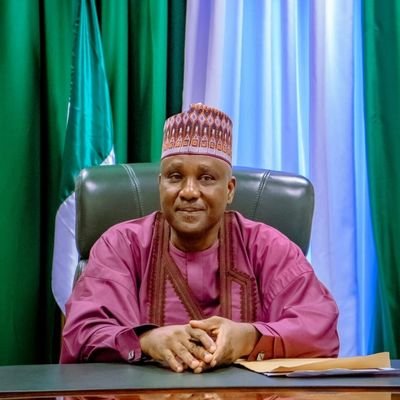By Adeyemi Adekunle
Abuja I Nigeria
In a bid to address the growing economic hardship in Nigeria, the House of Representatives has raised N704 million by implementing a 50 per cent cut to the basic salaries of its members. This bold initiative, aimed at supporting vulnerable Nigerians, was announced by Speaker Abbas Tajudeen during Thursday’s plenary session.
The decision, which spans over five months, underscores a rare show of solidarity from lawmakers amidst the mounting financial strain faced by millions of citizens. Speaker Tajudeen confirmed that he would personally lead a delegation of House leadership to present the funds to President Bola Ahmed Tinubu on December 31.
“If you recall, about five months ago, we decided to contribute half of our salaries to address the critical needs of the Nigerian people. I am happy to inform you that so far, we have contributed N704,907,578.82,” Tajudeen said.
He further noted that the contribution highlights the steadfastness and commitment of House members to easing the plight of Nigerians. “The contributions you made highlight the dedication of members to addressing the critical needs of Nigerians,” he added.
This move comes after a motion moved in July by Deputy Speaker Ben Kalu, urging lawmakers to sacrifice a portion of their earnings to alleviate the effects of economic reforms, which have exacerbated hardship among the country’s most vulnerable populations.
The Economic Crisis at Hand
Nigeria is currently grappling with an unprecedented cost-of-living crisis triggered by twin economic policies — the removal of petrol subsidies and the floating of the naira. These reforms, though lauded for their potential long-term benefits, have placed immense pressure on the average Nigerian household. Inflation reached a staggering 34.6 per cent in November 2024, while food inflation soared to 39.93 per cent year-on-year.
The fallout has been severe, with rising energy and food costs diminishing the purchasing power of citizens. Analysts argue that the crisis has hit the poor hardest, pushing millions further into poverty.
During the presentation of the 2024 national budget on Wednesday, President Tinubu acknowledged the magnitude of the crisis. “No Nigerian should go to bed hungry,” he remarked, assuring the nation of his administration’s commitment to easing the burden on citizens.
However, Nigerians have grown increasingly frustrated, with many demanding swift and tangible actions to address their struggles. Prominent among the calls is a reduction in the cost of governance, particularly the lavish allowances enjoyed by public officials, which critics argue contradict the government’s austerity narrative.
The House of Representatives’ decision to contribute half of their salaries was met with cautious optimism when it was first announced in July. Yet, questions remain about the true impact of the gesture.
The N704 Million: Symbolic or Substantial?
While the N704 million contribution has been hailed as a positive step, critics point out that the cuts only apply to the lawmakers’ basic salaries — a figure pegged at less than N1 million per month by the Revenue Mobilisation Allocation and Fiscal Commission (RMAFC). In contrast, allowances, which make up the bulk of legislators’ earnings, remain untouched. It is widely believed that members of the National Assembly earn upwards of N10 million monthly when allowances are factored in.
This has sparked mixed reactions from the public. While some Nigerians appreciate the gesture as a symbolic sacrifice by the lawmakers, others argue that it falls short of the decisive action needed to address the systemic issues fueling poverty.
“The House leadership needs to go beyond these token gestures,” said Ibrahim Yusuf, a public affairs analyst in Abuja. “If they are truly committed to reducing hardship, they should push for deeper reforms in the cost of governance, starting with their allowances and overall budgetary allocations.”
Moreover, the decision to hand over the funds to President Tinubu, rather than directly deploying them to support vulnerable Nigerians, has raised eyebrows. Critics question the rationale behind this approach and emphasize the need for transparency in managing such contributions.
A Nation Watching Closely
The upcoming handover ceremony on December 31 is likely to attract significant public attention. With millions of Nigerians battling economic uncertainty, the House of Representatives’ gesture will be closely scrutinized for its sincerity and impact.
For many Nigerians, the real challenge lies in ensuring that the N704 million reaches those who need it most. Civil society organizations have called for independent oversight of the funds to guarantee accountability. “We need assurances that every kobo of this money will be used to provide relief to Nigerians struggling to survive,” said Mary Uche, a representative of the Civil Society Network for Economic Justice.
The House’s initiative also raises broader questions about the role of the legislature in responding to national crises. While some view the pay cut as a commendable sacrifice, others argue that lawmakers wield far greater influence through policymaking and legislative oversight — tools that could drive systemic changes to combat inflation and poverty.
Public Sentiment and the Road Ahead
On the streets of Lagos, Kano, and Abuja, public opinion on the development remains divided. For Adebola Ajayi, a small-scale trader in Lagos, the gesture is a step in the right direction. “It’s good to see our leaders showing concern for the common man. I hope they use the money to help families who are really suffering,” she said.
However, for Abdullahi Shehu, a schoolteacher in Kano, the move feels hollow. “What we need are policies that will reduce the cost of food, electricity, and transportation. Cutting salaries alone won’t solve our problems,” he argued.
Economists in Abuja expressed similar sentiments, emphasizing the need for structural reforms. Dele Omonijo, an economic analyst, said, “While the N704 million is significant, it is merely a drop in the ocean compared to the scale of Nigeria’s economic challenges. Lawmakers must focus on passing laws that support job creation, reduce inflation, and stabilize the economy.”
As Speaker Abbas Tajudeen and his delegation prepare to present the N704 million contribution to President Tinubu, Nigerians remain hopeful yet cautious. The initiative highlights the lawmakers’ willingness to contribute to national recovery efforts, but it also brings to the fore deeper questions about leadership, governance, and accountability.
Whether this gesture marks a turning point or remains a symbolic act will depend on how effectively the funds are managed and whether it inspires broader efforts to tackle the country’s economic crisis. For now, the nation waits, watching closely to see if the promises made will translate into real relief for those who need it most.




